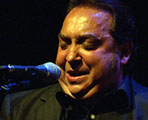1969 – 2010
|
Estela Zatania Like the bullfighter in Lorca’s poem… That’s how Fernando Fernández Pantoja, “Fernando Terremoto” left us Saturday, February 13th, 2010 at five in the afternoon, with his fifth decade on this planet just getting underway. Even when this man is so admired and loved by flamenco fans, it’s a difficult task, being right here in Jerez, to explain the magnitude of the loss. It is impossible to forget the sudden premature death 29 years ago of the father of the same name and nickname, also at the peak of his ability and creativity, a wound not yet healed even after all this time. Between father and son if you add up the years lived, it’s less than many people get, but their contribution has been great. Do we need to repeat the list of achievements going round the world right now as you read this? Fernando junior debuted as a flamenco singer almost accidentally in 1989 at an unscheduled performance at the Don Antonio Chacón flamenco club. Moved on-lookers soon gathered clogging the surrounding streets, and Fernando then understood clearly that his calling was not the guitar as it had been up until then, but cante. From that point on there were countless appearances at festivals, peñas, Madrid’s Zambra tablao, the 1994 Seville World’s Fair, first prize in the contest for young flamenco artists at the 9th Bienal de Flamenco, the intense collaboration with Israel Galván, most notably in La Edad de Oro where he was a fundamental and irreplaceable member of the small cast. Then there were the recordings: “La Herencia de la Sangre” (1989), “Cantes de la Campiña, Bahía y Sierra” (1991) and “Cosa Natural’ (1997)”. And his stunning triple victory at the 15th Córdoba Contest in 1998 when he won the Manuel Torre prize for siguiriya and martinete, the Niña de los Peines prize for soleá por bulería and bulerías and the Antonio Chacón prize for malagueña and taranto. He appeared at the most prestigious festivals including the Bienal de Flamenco de Sevilla, Mont de Marsán’s Festival de Arte Flamenco, the Flamenco Festival of Nimes, the Fiesta de la Bulería in Jerez, the festival of Mairena del Alcor, the Potaje Gitano de Utrera, recitals throughout Europe at the most important venues, and in his hometown he was awarded the Copa Jerez of the Cátedra de Flamencología. And Jerez mourns the loss of yet another favorite flamenco son who had to leave before time. And the world of flamenco mourns a loss which cannot possibly be assimilated in these precarious times for the art. And a family mourns…brothers and sisters, aunts and uncles, cousins, a wife and a small daughter who stole our hearts last September when her father gave an informal recital for family and friends at the Terremoto peña as a way of getting back into circulation after a long period of hospitalization. The unforgettable image of Fernando asking his daughter to sing for his dance, when the shy child didn’t want to, but Fernando lovingly insisted and the child pulled up a voice that really made you think this might be in the blood after all, and the father danced, and the daughter sang to him: “For whom shall I sing? I’ll sing for my father, it’s the only right thing”, and let me tell you, not a dry eye in the house. And I too mourn the loss of friendship of a sincere and affectionate human being, and the pleasure of hearing that electrifying voice that stood hairs on end. Las heridas quemaban como soles… The wounds were scorching
|
